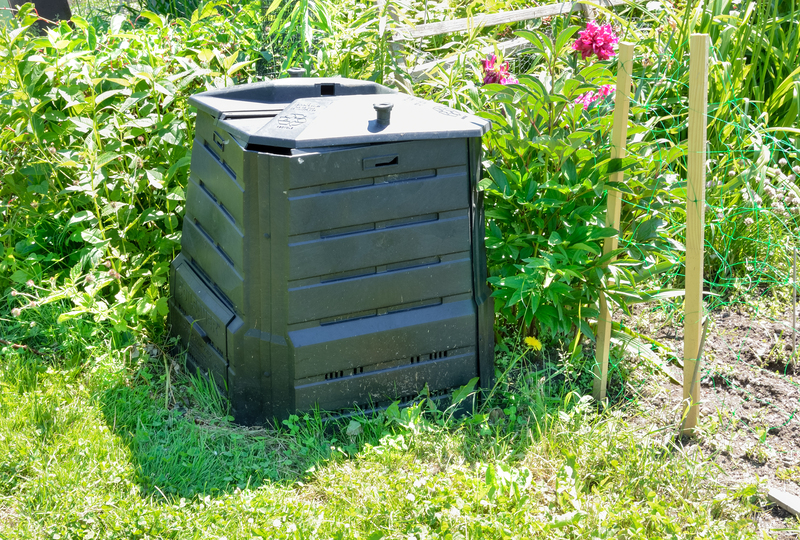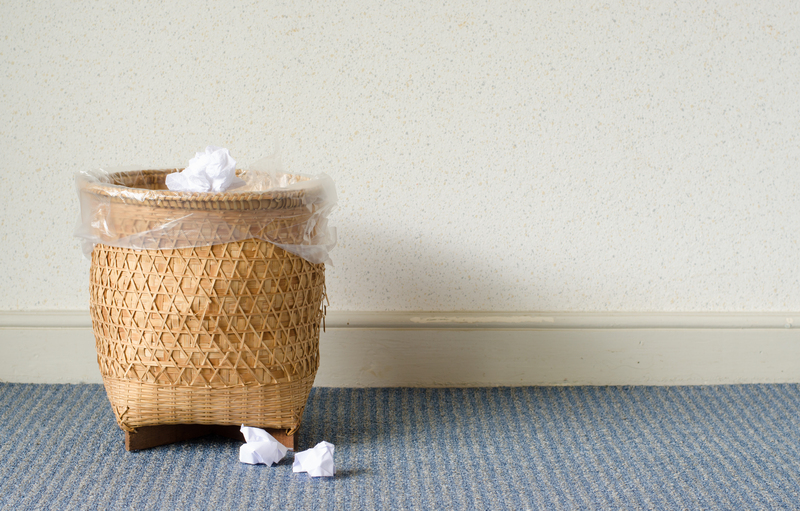Become a Recycling Pro with These Top Home Tips
Are you passionate about protecting the environment and reducing waste? Becoming a recycling pro at home is easier than you think! With just a few strategic changes to your daily habits, you can dramatically increase the effectiveness of your household recycling and contribute to a greener, healthier planet. Read on for comprehensive, practical advice--packed with clever tricks--to help you master recycling at home and transform the way you think about waste.
Why Becoming a Home Recycling Expert Matters
Recycling is much more than just separating plastic bottles and cans from your household trash. By understanding best practices and adopting the right habits, you decrease landfill waste, save energy, and conserve valuable resources. Here's why improving your home recycling game is vital:
- Reduces Landfill Waste: Every item you recycle keeps one less piece of trash from our already overflowing landfills.
- Saves Energy and Natural Resources: Manufacturing with recycled materials uses fewer resources than starting from scratch.
- Combats Climate Change: Proper recycling minimizes greenhouse gas emissions and reduces your ecological footprint.
- Supports the Circular Economy: Recycled materials keep products in use for longer, promoting sustainability.
Fact: According to the EPA, recycling just one ton of paper saves 17 trees and 7,000 gallons of water!

Get to Know Your Local Recycling Rules
Every municipality handles recycling a little differently. To truly become a recycling pro at home, it's essential to understand which materials are accepted in your curbside bin and how they should be prepared.
- Visit your city's or waste hauler's website for a detailed list of recyclables.
- Download and print a handy cheat sheet to post near your bins for easy reference.
- Sign up for alerts or newsletters to stay updated on holiday schedules or rule changes.
- If in doubt, don't recycle it--non-recyclable items can spoil entire batches!
Top Home Recycling Tips for Beginners and Enthusiasts
1. Designate a Recycling Station
Create a dedicated recycling area in your kitchen, garage, or mudroom. Use separate bins for paper, plastics, glass, and metals--and label them clearly. This makes sorting easier for every family member, including kids.
2. Wash and Dry Containers
Rinse all food containers before tossing them in the recycling bin. Food residue attracts pests and can disrupt the recycling process. Set containers on your drying rack until they're air-dried and ready to go!
3. Flatten Cardboard and Crush Bottles
Break down large cardboard boxes to save room in your bin. For plastic bottles, check your local guidelines; in many areas, you can crush them to maximize space--just be sure to keep the caps on, if allowed.
4. Learn to "Wishcycle" No More
Many well-intentioned recyclers are guilty of "wishcycling"--throwing suspect items in the bin, hoping they're recyclable. Items like greasy pizza boxes, disposable coffee cups, plastic bags, and batteries usually don't belong in your curbside recycling. Always check first!
5. Compost Food Scraps and Yard Waste
Organic waste makes up a large portion of household trash, but most food scraps and yard trimmings can be composted. Set up a backyard compost bin or use a local pickup service to never send this material to landfill again.
Beyond the Basics: Advanced Recycling Tips for Home
1. Recycle Unusual Items
Some things can't go in the curbside bin but can be recycled elsewhere. Examples include:
- Batteries (recycle at designated drop-off points or special events)
- Electronics (use e-waste recycling centers or retailer take-back programs)
- Plastic bags and film (return to participating grocery stores)
- Medications (use pharmacy take-back days)
Visit Earth911.com or your local government's recycling page for resources on these "tricky" recyclables.
2. Get Crafty with Repurposing
Before tossing items in the bin, consider if they can be reused or upcycled first. Glass jars make great storage containers, old t-shirts can become cleaning rags, and coffee cans are perfect for organizing tools or craft supplies.
3. Mind Your E-Waste
Electronics are rarely accepted in curbside programs, but they contain precious metals and hazardous materials--never throw them in the trash! Many retailers offer free drop-off for old phones, computers, and more. Always wipe personal data before recycling.
Mastering the Art of Sorting: What Goes Where?
Sorting your recycling correctly is the most critical step to becoming a home recycling expert. Different materials often require different handling. Here's a quick reference:
What to Recycle Curbside in Most Areas:
- Paper and Cardboard: newspapers, magazines, flattened boxes (avoid anything soiled with food or grease)
- Plastics: check for numbers #1 and #2--usually bottles and containers (rinse first!)
- Metals: aluminum cans, tin cans, clean foil
- Glass: bottles and jars (remove lids and rinse)
What NOT to Recycle in Your Home Bin:
- Plastic bags and flexible film
- Greasy food containers (e.g., pizza boxes)
- Styrofoam (polystyrene)
- Diapers and sanitary products
- Batteries and electronics
- Broken glass, mirrors, and ceramics
Seven Unexpected Ways to Reduce and Reuse at Home
Recycling is only one part of the equation. In fact, the famous "Reduce, Reuse, Recycle" mantra places recycling last--meaning we should actively strive to create less waste in the first place. Here are simple ways to go even further:
- Buy in Bulk: Reduce packaging waste by purchasing larger quantities and storing food in reusable containers.
- Choose Reusable Bags: Bring cloth bags for groceries and produce--skip single-use plastic!
- Opt for Refillable Water Bottles: Cut down on plastic and save money.
- Repair Before Replacing: Mend clothing, fix small appliances, and try DIY repairs.
- Donate or Sell: Instead of trashing unwanted goods, list them online or donate to local charities.
- Avoid Disposable Tableware: Use real dishes and cutlery--even at picnics or parties.
- Choose Products with Less Packaging: Shop in bulk food stores and look for products with minimal packaging.
Family-Friendly Recycling: Get Everyone Involved
Recycling at home is far more effective when the whole household participates. Make it fun and educational for kids by:
- Letting them decorate bins with signs and stickers
- Turning sorting into a game--who can sort the fastest?
- Explaining why recycling matters for the planet and their future
- Encouraging upcycling craft projects with safe recyclable materials
Tip: Establish a weekly routine for taking out the recycling together, so everyone takes pride in their eco-friendly efforts!
Common Recycling Mistakes--and How to Avoid Them
Even with the best intentions, small mistakes can have a big impact--and potentially cause the entire contents of the bin to end up in landfill. Watch out for these pitfalls:
- Bagging Recyclables: Most programs don't accept plastic bags. Always put recyclables loose in the bin.
- Ignoring Contamination: Just a bit of food or liquid can ruin a whole batch--rinse, empty, and dry everything first.
- Recycling Hazardous Items: Items like batteries, electronics, and chemicals should be recycled at designated facilities.
- Confusing Compostable and Recyclable: Biodegradable or compostable plastics are not meant for standard recycling streams.
- Assuming All Plastics are Recyclable: Only certain types are accepted. Check the number inside the recycling symbol and local guidelines.
Stay Updated with Recycling Apps and Resources
Technology can make home recycling easier than ever. Download free apps or bookmark online resources to quickly check whether an item can be recycled or not.
- Recycle Coach: Personalized local recycling information
- Earth911: Search for local recycling centers by material
- iRecycle: Detailed guides for thousands of items
- Local government websites: Always consult your city's resources for the latest rules

Set Up a Winning Home Recycling Routine
Your efforts will stick if you build recycling into your family's routine. Here are some ways to make it second nature:
- Place recycling bins in convenient, high-traffic areas
- Keep a reminder checklist on the fridge--or use sticky notes for kids
- Schedule a regular time each week for taking out recycling
- Create a reward system or "green jar" for eco-friendly milestones
Ready to Become a Recycling Pro at Home?
Every action counts--by becoming a recycling expert in your own home, you help shape a more sustainable world. Encourage your friends, neighbors, and co-workers to join you on your eco-friendly journey.
- Lead by example: Talk about your recycling wins (and learning moments) with others--your enthusiasm can be contagious!
- Host a home waste audit: Sort a week's garbage and discover how much could have been recycled or composted--and where you can improve.
- Stay positive and persistent: Progress, not perfection, is the key. Over time, becoming a recycling pro will feel effortless.
Ready to make a difference? With these top home recycling tips, you're set to become a home recycling professional--reducing waste, saving resources, and inspiring those around you. Start today and see just how much impact your household can have!






